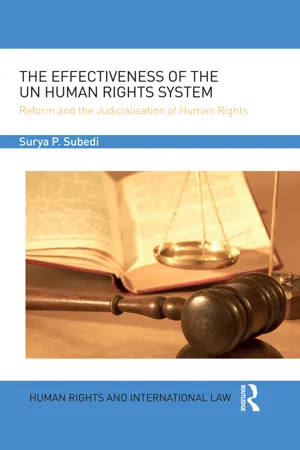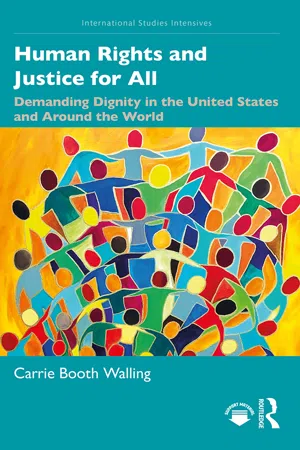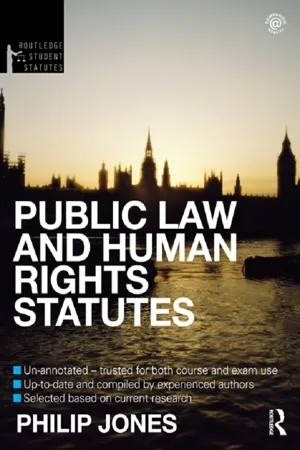United Nations human rights
The United Nations human rights refer to the fundamental rights and freedoms that are recognized and protected by the United Nations. These rights are outlined in various international treaties and declarations, such as the Universal Declaration of Human Rights. The UN works to promote and protect these rights through various mechanisms, including monitoring and reporting on human rights violations.
6 Key excerpts on "United Nations human rights"
- eBook - ePub
The Effectiveness of the UN Human Rights System
Reform and the Judicialisation of Human Rights
- Surya Subedi, OBE, QC (Hon)(Authors)
- 2017(Publication Date)
- Routledge(Publisher)
...These rights come in different forms – enshrined in the Universal Declaration of Human Rights, rights recognised as jus cogens, or simply rights recognised as general universal principles of international law. Regardless of whether they are conventional or customary, States which are members of the UN must accept those human rights as the minimum even if they are not party to any other international human rights treaties. Naturally, in the case of States that are party to other international human rights treaties, they have an additional obligation to abide by the human rights commitments they have made. 13 On the basis of the universal acceptance of the universality of human rights 14 – or at least with regard to the rights embodied in the Universal Declaration of Human Rights – and the erga omnes character of basic human rights as stipulated in the judgment of the International Court of Justice in the Barcelona Traction 15 case, it can be held that the law is settled that States have a right to express their concern about the violations of basic human rights in another State. Consequently, human rights matters can no longer be regarded as ‘off limits’ to the international community as ‘matters which are essentially within the domestic jurisdiction of any State’. 16 In the long history of human civilisation, the UN has made a profound contribution to the development of human rights within a relatively short period of time, spanning a mere six or seven decades, and has created mechanisms to promote and protect human rights. More so in fact, than any thinkers, philosophers, nations and other institutions...
- eBook - ePub
Human Rights and Justice for All
Demanding Dignity in the United States and Around the World
- Carrie Walling(Author)
- 2022(Publication Date)
- Routledge(Publisher)
...Although human rights are seldom fully realized, and often violated, that does not mean they do not exist. Rather, it is the deprivation of our human rights that mobilizes political action to claim them. In sum, human rights are the rights that every human is entitled to and are necessary for a life of dignity. Human rights are inalienable, equal, and interdependent. The content of our human rights are described in the Universal Declaration of Human Rights (UDHR) which passed without dissent in 1948 by the United Nations (UN) General Assembly, is legally codified in multiple international treaties, and was reaffirmed by UN members from all regions of the world through regional treaties and at the World Conference of Human Rights in 1993 and again in the UN 75 Declaration of 2020. 1 Available in more than 500 languages and dialects, the UDHR is the most widely translated document in the world. The UDHR is composed of 30 articles which promote a shared vision of basic human rights and dignities that apply to all people in all nations (see Box 1.1). The preamble identifies respect for these human rights as, “the foundation of freedom, justice and peace in the world,” and disregard for human rights as barriers to their achievement. The 30 articles entail a variety of civil, political, economic, social, and cultural rights. These include the right to life (Article 3), peaceful assembly (Article 20), religion (Article 18), free and fair trial processes and humane treatment (Articles 5, 8–10), as well as reasonable work conditions, fair pay (Article 23), access to education (Article 26), and participation in cultural life and scientific advances (Article 27). By presenting these rights in a single document, the drafters signaled that these basic rights were interrelated and mutually reinforcing. For example, Article 6 says that everyone has the right to recognition as a person before the law – the right to a legal identity...
- eBook - ePub
Pursuing Justice
Traditional and Contemporary Issues in Our Communities and the World
- Ralph A. Weisheit, Frank Morn(Authors)
- 2018(Publication Date)
- Routledge(Publisher)
...UNIVERSAL DECLARATION OF HUMAN RIGHTS as a common standard of achievement for all peoples and all nations, to the end that every individual and every organ of society, keeping this Declaration constantly in mind, shall strive by teaching and education to promote respect for these rights and freedoms and by progressive measures, national and international, to secure their universal and effective recognition and observance, both among the peoples of Member States themselves and among the peoples of territories under their jurisdiction. Article 1 All human beings are born free and equal in dignity and rights. They are endowed with reason and conscience and should act toward one another in a spirit of brotherhood. Article 2 Everyone is entitled to all the rights and freedoms set forth in this Declaration, without distinction of any kind, such as race, colour, sex, language, religion, political or other opinion, national or social origin, property, birth or other status. Furthermore, no distinction shall be made on the basis of the political, jurisdictional or international status of the country or territory to which a person belongs, whether it be independent, trust, non-self-governing or under any other limitation of sovereignty. Article 3 Everyone has the right to life, liberty and security of person. Article 4 No one shall be held in slavery or servitude; slavery and the slave trade shall be prohibited in all their forms. Article 5 No one shall be subjected to torture or to cruel, inhuman or degrading treatment or punishment. Article 6 Everyone has the right to recognition everywhere as a person before the law. Article 7 All are equal before the law and are entitled without any discrimination to equal protection of the law...
- eBook - ePub
- United Nations DPI(Author)
- 2017(Publication Date)
- United Nations(Publisher)
...Assembly proclaims this Universal Declaration of Human Rights as a common standard of achievement for all peoples and all nations, to the end that every individual and every organ of society, keeping this Declaration constantly in mind, shall strive by teaching and education to promote respect for these rights and freedoms and by progressive measures, national and international, to secure their universal and effective recognition and observance, both among the peoples of Member States themselves and among the peoples of territories under their jurisdiction. Article 1 All human beings are born free and equal in dignity and rights. They are endowed with reason and conscience and should act towards one another in a spirit of brotherhood. Article 2 Everyone is entitled to all the rights and freedoms set forth in this Declaration, without distinction of any kind, such as race, colour, sex, language, religion, political or other opinion, national or social origin, property, birth or other status. Furthermore, no distinction shall be made on the basis of the political, jurisdictional or international status of the country or territory to which a person belongs, whether it be independent, trust, non-self-governing or under any other limitation of sovereignty. Article 3 Everyone has the right to life, liberty and security of person. Article 4 No one shall be held in slavery or servitude; slavery and the slave trade shall be prohibited in all their forms. Article 5 No one shall be subjected to torture or to cruel, inhuman or degrading treatment or punishment. Article 6 Everyone has the right to recognition everywhere as a person before the law. Article 7 All are equal before the law and are entitled without any discrimination to equal protection of the law...
- eBook - ePub
- Philip Jones(Author)
- 2012(Publication Date)
- Routledge(Publisher)
...International and Regional Instruments UNIVERSAL DECLARATION OF HUMAN RIGHTS 1948 P REAMBLE Whereas recognition of the inherent dignity and of the equal and inalienable rights of all members of the human family is the foundation of freedom, justice and peace in the world, Whereas disregard and contempt for human rights have resulted in barbarous acts which have outraged the conscience of mankind, and the advent of a world in which human beings shall enjoy freedom of speech and belief and freedom from fear and want has been proclaimed as the highest aspiration of the common people, Whereas it is essential, if man is not to be compelled to have recourse, as a last resort, to rebellion against tyranny and oppression, that human rights should be protected by the rule of law, Whereas it is essential to promote the development of friendly relations between nations, Whereas the peoples of the United Nations have in the Charter reaffirmed their faith in fundamental human rights, in the dignity and worth of the human person and in the equal rights of men and women and have determined to promote social progress and better standards of life in larger freedom, Whereas Member States have pledged themselves to achieve, in co-operation with the United Nations, the promotion of universal respect for and observance of human rights and fundamental freedoms, Whereas a common understanding of these rights and freedoms is of the greatest importance for the full realization of this pledge, Now, Therefore THE GENERAL ASSEMBLY proclaims THIS UNIVERSAL DECLARATION OF HUMAN RIGHTS as a common standard of achievement for all peoples and all...
- eBook - ePub
- P. R. Ghandhi(Author)
- 2019(Publication Date)
- Routledge(Publisher)
...The International Covenant on Civil and Political Rights (1966) PREAMBLE The States Parties to the Present Covenant, Considering that, in accordance with the principles proclaimed in the Charter of the United Nations, recognition of the inherent dignity and of the equal and inalienable rights of all members of the human family is the foundation of freedom, justice and peace in the world, Recognising that these rights derive from the inherent dignity of the human person, Recognising that, in accordance with the Universal Declaration of Human Rights, the ideal of free human beings enjoying civil and political freedom and freedom from fear and want can only be achieved if conditions are created whereby everyone may enjoy his civil and political rights, as well as his economic, social and cultural rights, Considering the obligation of States under the Charter of the United Nations to promote universal respect for, and observance of, human rights and freedoms, Realising that the individual, having duties to other individuals and to the community to which he belongs, is under a responsibility to strive for the promotion and observance of the rights recognised in the present Covenant, Agree upon the following articles: PART I Article 1 All peoples have the right of self-determination. By virtue of that right they freely determine their political status and freely pursue their economic, social and cultural development. All peoples may, for their own ends, freely dispose of their natural wealth and resources without prejudice to any obligations arising out of international economic co-operation, based upon the principle of mutual benefit, and international law...





